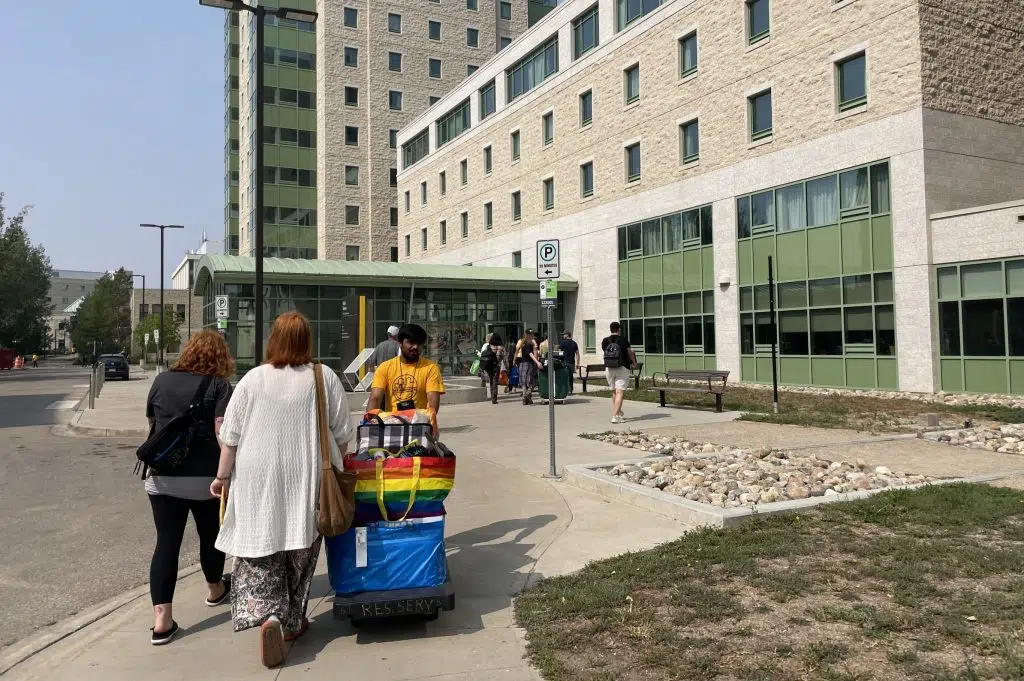Students unloaded their vehicles into green bins Monday and hauled their belongings up to their rooms for the next eight months.
Over the course of the next two days, 1,100 students will organize and decorate their rooms at the University of Regina.
Jessica Selensky, a first-year nursing student, is most excited about doing her clinical. She also hopes to spend time playing recreational basketball and volleyball, and hopefully gets into a spin class.
Gloria, who’s studying international business, moved in a few days ago. According to her, the food is not the same as it is in Mexico.
“I miss the food already,” she said. “It isn’t bad (here) but it’s not like Mexican.”
U of R president Jeff Keshen said it can be a bittersweet day for some parents seeing their kids move out of the house, but also an exciting day for students who are on the first step of the journey to getting their degree.
About 1,100 dorm rooms are occupied at the university with 1,600 rooms still available. Keshen would like to see more students move in because it adds more to their university experience.
That’s part of the reason why Jackson Wingert, a business and communications major, is eager to start the semester.
“(I’m looking forward to) getting to meet new people and getting to interact with everyone,” Wingert said when asked what he was most excited about in post-secondary school.
This year, all residence buildings are back open, and 30 per cent more students are coming though the doors to stay on campus.
“Dormitories are filling up better than they had — and particularly during COVID. Having empty buildings was horrid for budgetary purposes, just for the whole university as well,” said Keshen.
Heidi Clark, a first-year nursing student, said living in dorms would be a big change coming from a small town. She said she packed lots of snacks for her room, and her coffee machine.
“I really like my coffee in the morning,” said Clark.
Expenses going up
Tuition is going up at the University of Regina like many other post-secondary institutions in the province.
In the fall 2023 semester, tuition will rise by four per cent for students.
For international students, tuition typically costs about three times more than it does for domestic students.
Keshen recognizes that costs can be a worry for the students trying to pay bills at the end of the month.
“Inflation is a real problem for people. Their families are really struggling,” said Keshen. “There’s no escaping the fact that tuition does increase.”
The university is trying to provide opportunities to students to meet these costs with opportunities to work on campus and co-op work terms.
Students will not have costs cut by living in residence but they will be freezing housing rates and tuition rates while living in residence.
“If they are living on campus they are making an investment, and we are making an investment in them as well,” said Keshen. “I don’t want to pretend that that solves the issue because it is an investment that students are making. It’s an investment that costs them a lot, and their families a lot, and what I hope we deliver at the end of that with our opportunities.”
Keshen said the goal for each student who comes through the university is to help them land a job once they get their degree.
Many students moving in expressed mixed reactions about expenses of tuition and living arrangements. Some said it was not a concern, but others had it on their minds.
“It’s always a worry in some spots but you can usually figure it out,” said Wingert.
Hailey Taylor wasn’t sure, but her mom chimed in about the cost.
“We are always worried about the cost,” she said. “It’s always rising, so hopefully everything works out.”
“My family is covering most of it,” added Selensky, but she noted the costs are lingering in the back of her mind.
Lots of buildings sat empty during the pandemic that still had to be heated, cooled and cleaned during the pandemic. Keshen said the university is also feeling the effects of inflation, including about $30 million over the course of the pandemic.











